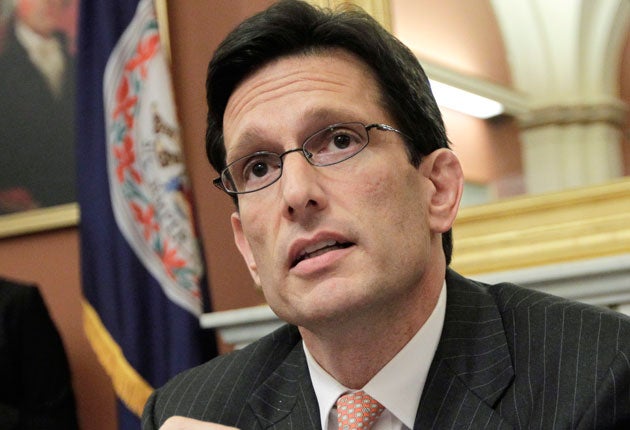Obama offers $4trn cuts to break deficit deadlock

Your support helps us to tell the story
From reproductive rights to climate change to Big Tech, The Independent is on the ground when the story is developing. Whether it's investigating the financials of Elon Musk's pro-Trump PAC or producing our latest documentary, 'The A Word', which shines a light on the American women fighting for reproductive rights, we know how important it is to parse out the facts from the messaging.
At such a critical moment in US history, we need reporters on the ground. Your donation allows us to keep sending journalists to speak to both sides of the story.
The Independent is trusted by Americans across the entire political spectrum. And unlike many other quality news outlets, we choose not to lock Americans out of our reporting and analysis with paywalls. We believe quality journalism should be available to everyone, paid for by those who can afford it.
Your support makes all the difference.The fraught negotiations on a US deficit reduction plan gained new impetus yesterday, as President Barack Obama proposed a far larger package of spending cuts and tax increases, including changes in long-sacrosanct government retirement and health care programmes, that would save up to $4trn (£2.5trn) over the next decade. Speaking to reporters after a meeting with Congressional leaders from both parties, Mr Obama described the discussions as "very constructive and frank".
A further round of talks would take place on Sunday when, he hoped, the "hard bargaining" would be done to get a deal. But, he stressed, "nothing is agreed until everything is agreed".
The White House session was the latest attempt to strike a deal that will avert a Republican threat to block an increase in the authorised government debt ceiling. That limit, $14.3trn, has already been reached. Without an increase in place by 2 August, the Treasury says the US Government will start to default on debt repayments for the first time in its history.
With its new gambit, the White House aims to show its seriousness about bringing the country's finances back on to an even keel, getting under control a budget deficit that will reach $1.5trn in 2011. Administration officials also say a more ambitious package has a better chance that the smaller $2.5trn target the parties have been talking about thus far.
By offering to reduce the benefits paid by Social Security and Medicare, which the Democrats have always defended, Mr Obama is putting pressure on Republicans to drop their resistance to tax increases of any kind. Concentrating everyone's mind is the approaching debt deadline, amid warnings that even a partial US default would throw world financial markets into chaos.
"I think there'll be a spirit of trying to get results here," the House Majority Leader, Eric Cantor, said as the latest talks started.
The emerging plan still faces stiff opposition from both ends of the political spectrum. Many Democrats fiercely oppose any cut in Medicare benefits in particular, arguing that the party would be deprived of a potent issue in the upcoming election campaign. But Republicans, led by the new Tea Party intake into Congress, still insist that all savings should be secured exclusively by spending cuts that would reduce the size of government.
Some Democrats argue that Mr Obama could settle the issue at a stroke, bypassing Congress entirely and citing the 14th amendment to the US constitution. Passed in 1868, in the wake of the Civil War, the amendment flatly declares that "the validity of the public debt of the United States... shall not be questioned". Some legal scholars say this renders superfluous any congressional attempt to impose a ceiling on that debt.
Join our commenting forum
Join thought-provoking conversations, follow other Independent readers and see their replies
Comments